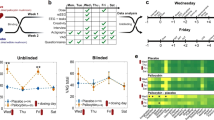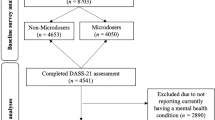Abstract
Background
A WW (formerly Weight Watchers) program adapted for persons with type 2 diabetes mellitus (T2DM) previously was found to be more effective than standard care (SC) intervention for weight loss, improved glycemic control, and weight- and diabetes-related quality of life measures. With data from the same national trial, this study examined whether WW adapted for persons with T2DM also increased engagement in weight control behaviors and decreased hedonic hunger, each of which could contribute to improved diabetes management.
Intervention and methods
Individuals with T2DM (n = 563) and overweight or obesity participated in a 12-month, 16-site, randomized trial of WW with diabetes counseling or SC. Hierarchical linear modeling (HLM) evaluated whether 12-month changes in weight control behaviors (Eating Behavior Inventory; EBI) and hedonic hunger (Power of Food Scale; PFS) differed by treatment condition. If a significant treatment effect was found, 12-month changes in EBI/PFS were regressed on 12-month changes in HbA1c and percent weight loss to explore potential treatment differences in these associations.
Results
EBI scores increased significantly over the 12-months (p < 0.001), with greater improvements in WW than SC (p < 0.001). PFS decreased significantly in the 12-months (p < 0.001), with no differences between treatment groups (p = 0.15). HLM analyses that followed up on the significant treatment effect for 12-month change in EBI revealed no significant differences by treatment condition for the relationship between change in EBI scores and change in HbA1c (p = 0.14) or percent weight loss (p = 0.32). Across all participants, 12-month improvements in EBI and PFS were related to improved HbA1c (r = 0.22; −0.13, respectively) and greater percent weight loss (r = 0.41; −0.18, respectively) (ps < 0.01).
Conclusions
WW with diabetes counseling produced greater engagement in weight control behaviors in those with T2DM than did SC. Across both groups, improved weight control behaviors and hedonic hunger were related to improved glycemic control and weight loss.
This is a preview of subscription content, access via your institution
Access options
Subscribe to this journal
Receive 12 print issues and online access
$259.00 per year
only $21.58 per issue
Buy this article
- Purchase on Springer Link
- Instant access to full article PDF
Prices may be subject to local taxes which are calculated during checkout


Similar content being viewed by others
References
Menke A, Casagrande S, Geiss L, Cowie CC. Prevalence of and trends in diabetes among adults in the United States, 1988-2012. JAMA. 2015;314:1021–9. PubMed PMID: 26348752.
Geiss LS, Wang J, Cheng YJ, Thompson TJ, Barker L, Li Y, et al. Prevalence and incidence trends for diagnosed diabetes among adults aged 20 to 79 years, United States, 1980-2012. JAMA. 2014;312:1218–26. PubMed PMID: 25247518.
Yang W, Dall TM, Beronjia K, Lin J, Semilla AP, Chakrabarti R, et al. Economic costs of diabetes in the US in 2017. Diabetes Care. 2018;41:917–28.
Zhuo X, Zhang P, Hoerger TJ. Lifetime direct medical costs of treating type 2 diabetes and diabetic complications. Am J Prev Med. 2013 ;45:253–61. PubMed PMID: 23953350.
Centers for Disease Control and Prevention. National diabetes statistics report, 2017. Atlanta, GA: Centers for Disease Control and Prevention; 2017.
Yoon PW, Bastian B, Anderson RN, Collins JL, Jaffe HW, Centers for Disease C. et al. Potentially preventable deaths from the five leading causes of death-United States, 2008–10. MMWR Morb Mortal Wkly Rep. 2014;63:369–74. PubMed PMID: 24785982. Pubmed Central PMCID: 4584887.
Garcia MC, Faul M, Massetti G, Thomas CC, Hong Y, Bauer UE, et al. Reducing potentially excess deaths from the five leading causes of death in the rural United States. Morb Mortal Wkly Rep Surveill Summ. 2017;66:1–7. PubMed PMID: 28081057. Pubmed Central PMCID: 5829929.
Wing RR, Lang W, Wadden TA, Safford M, Knowler WC, Bertoni AG, et al. Benefits of modest weight loss in improving cardiovascular risk factors in overweight and obese individuals with type 2 diabetes. Diabetes Care. 2011;34:1481–6. PubMed PMID: 21593294. Pubmed Central PMCID: 3120182.
Fujioka K. Benefits of moderate weight loss in patients with type 2 diabetes. Diabetes Obesity Metab. 2010;12:186–94. PubMed PMID: 20151995.
O’Neil PM, Miller-Kovach K, Tuerk PW, Becker LE, Wadden TA, Fujioka K, et al. Randomized controlled trial of a nationally available weight control program tailored for adults with type 2 diabetes. Obesity. 2016;24:2269–77. PubMed PMID: 27804264.
Holland-Carter L, Tuerk PW, Wadden TA, Fujioka KN, Becker LE, Miller-Kovach K, et al. Impact on psychosocial outcomes of a nationally available weight management program tailored for individuals with type 2 diabetes: results of a randomized controlled trial. J Diabetes Complicat. 2017;31:891–7. PubMed PMID: 28319001.
O’Neil PM, Rieder S. Utility and validity of the eating behavior inventory in clinical obesity research: a review of the literature. Obes Rev. 2005;6:209–16. PubMed PMID: 16045636.
O’Neil PM, Currey HS, Hirsch AA, Malcolm RJ, Sexauer JD, Riddle FE, et al. Development and validation of the eating behavior inventory. J Behav Assess. 1979;1:123–32.
Lowe MR, Butryn ML. Hedonic hunger: a new dimension of appetite? Physiol Behav. 2007;91:432–9. PubMed PMID: 17531274.
Lowe MR, Butryn ML, Didie ER, Annunziato RA, Thomas JG, Crerand CE, et al. The power of food scale. A new measure of the psychological influence of the food environment. Appetite. 2009;53:114–8. PubMed PMID: 19500623.
O’Neil PM, Theim KR, Boeka A, Johnson G, Miller-Kovach K. Changes in weight control behaviors and hedonic hunger during a 12-week commercial weight loss program. Eat Behav. 2012;13:354–60. PubMed PMID: 23121787.
Theim KR, Brown JD, Juarascio AS, Malcolm RR, O’Neil PM. Relations of hedonic hunger and behavioral change to weight loss among adults in a behavioral weight loss program utilizing meal-replacement products. Behav Modif. 2013;37:790–805. PubMed PMID: 24013101.
Kroenke K, Spitzer RL, Williams JB. The PHQ-9: validity of a brief depression severity measure. J Gen Intern Med. 2001;16:606–13. PubMed PMID: 11556941. Pubmed Central PMCID: PMC1495268.
Ali MK, Bullard KM, Saaddine JB, Cowie CC, Imperatore G, Gregg EW. Achievement of goals in U.S. diabetes care, 1999-2010. N Engl J Med. 2013;368:1613–24. PubMed PMID: 23614587.
Robbins JM, Thatcher GE, Webb DA, Valdmanis VG. Nutritionist visits, diabetes classes, and hospitalization rates and charges: the Urban Diabetes Study. Diabetes Care. 2008;31:655–60. PubMed PMID: 18184894. Pubmed Central PMCID: PMC2423227.
Cappelleri JC, Bushmakin AG, Gerber RA, Leidy NK, Sexton CC, Karlsson J, et al. Evaluating the Power of Food Scale in obese subjects and a general sample of individuals: development and measurement properties. Int J Obes (Lond). 2009;33:913–22. PubMed PMID: 19506564.
Guare JC, Wing RR, Marcus MD, Epstein LH, Burton LR, Gooding WE. Analysis of changes in eating behavior and weight loss in type II diabetic patients. Which behaviors to change. Diabetes Care. 1989;12:500–3. PubMed PMID: 2758955.
Acknowledgements
This study was funded by a grant to the Medical University of South Carolina from WW (formerly Weight Watchers).
Author information
Authors and Affiliations
Corresponding authors
Ethics declarations
Conflict of interest
This study was funded by a grant to the Medical University of South Carolina from WW (formerly Weight Watchers). TAW, KF, RFK, WTG, DMR, RJM, DW, and WJR received funding from MUSC to conduct this research at their sites. PMO has received this and other research support from WW. At the time of this study, JLV, KM-K and SLR were employees of WW and held WW stock. KM-K and SLR are listed on WW patents.
Additional information
Publisher’s note Springer Nature remains neutral with regard to jurisdictional claims in published maps and institutional affiliations.
Rights and permissions
About this article
Cite this article
Schulte, E.M., Tuerk, P.W., Wadden, T.A. et al. Changes in weight control behaviors and hedonic hunger in a commercial weight management program adapted for individuals with type 2 diabetes. Int J Obes 44, 990–998 (2020). https://doi.org/10.1038/s41366-020-0530-x
Received:
Revised:
Accepted:
Published:
Issue Date:
DOI: https://doi.org/10.1038/s41366-020-0530-x
This article is cited by
-
The relationship between psychological distress and weight maintenance in weight cycling: mediating role of eating behavior
BMC Public Health (2024)
-
Obese mice weight loss role on nonalcoholic fatty liver disease and endoplasmic reticulum stress treated by a GLP-1 receptor agonist
International Journal of Obesity (2022)



